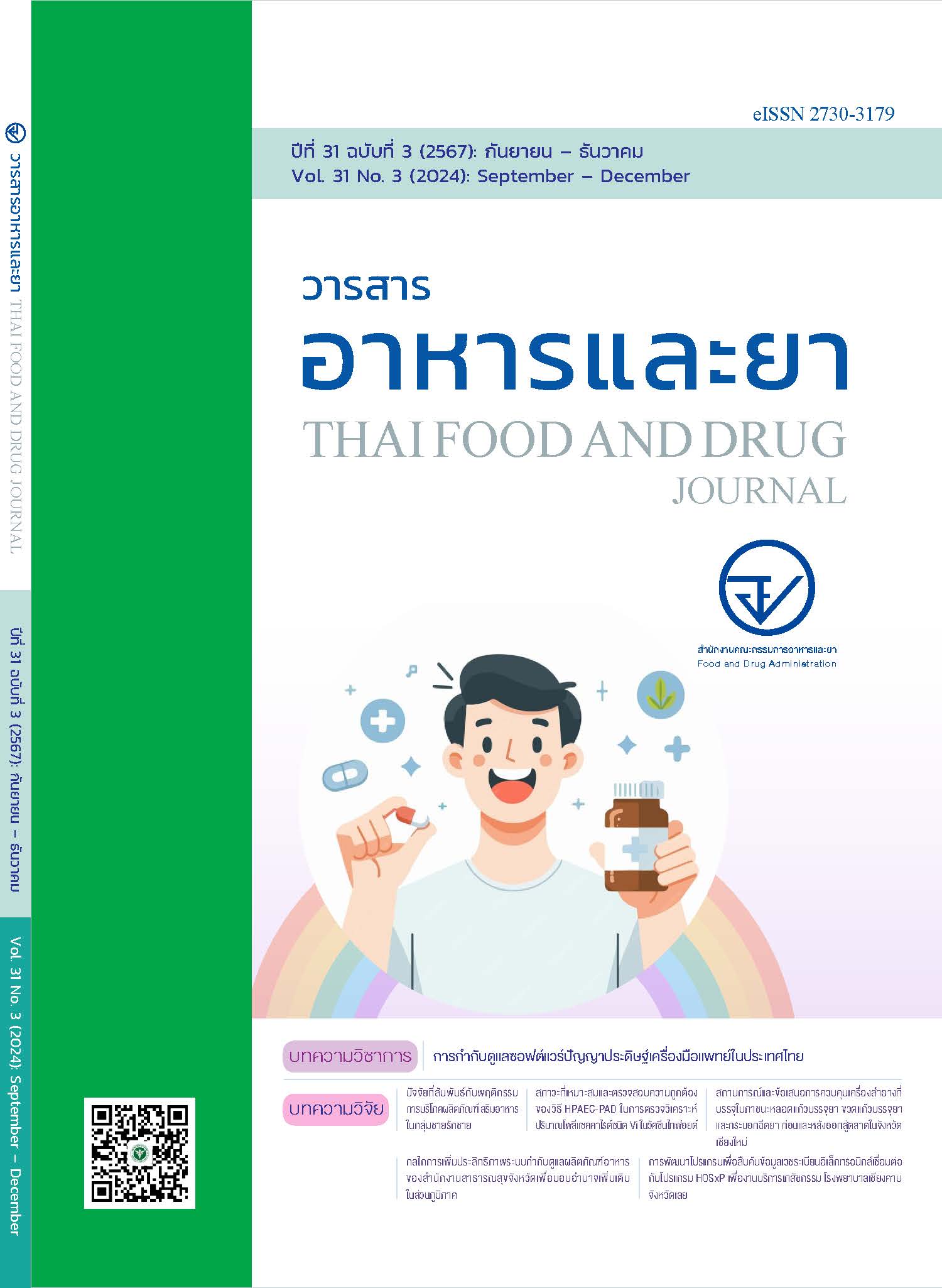กลไกการเพิ่มประสิทธิภาพระบบกำกับดูแลผลิตภัณฑ์อาหารของสำนักงานสาธารณสุขจังหวัดเพื่อมอบอำนาจเพิ่มเติมในส่วนภูมิภาค
Main Article Content
บทคัดย่อ
ความสำคัญ: สำนักงานคณะกรรมการอาหารและยา (อย.) มีหน้าที่ความรับผิดชอบในการคุ้มครองผู้บริโภคให้ได้รับผลิตภัณฑ์อาหารที่ปลอดภัย คุ้มค่า และสมประโยชน์ โดยกำกับดูแลและเฝ้าระวังผลิตภัณฑ์ สถานประกอบการด้านอาหาร และการโฆษณาให้เป็นไปตามกฎหมายทั่วประเทศ จึงได้มอบอำนาจให้ผู้ว่าราชการจังหวัดและเจ้าหน้าที่สำนักงานสาธารณสุขจังหวัด (สสจ.) ในการรับขึ้นทะเบียนและอนุญาตเกี่ยวกับผลิตภัณฑ์ สถานที่ผลิตและนำเข้าอาหาร การโฆษณา และเฝ้าระวังผลิตภัณฑ์และสถานประกอบการด้านอาหาร รวมทั้งให้อำนาจในการพักใช้ใบอนุญาต หรือการเพิกถอนใบอนุญาต และการเปรียบเทียบปรับตาม พ.ร.บ. อาหาร พ.ศ. 2522 มาตั้งแต่ปี 2536 ดังนั้นเพื่อให้กลไกดังกล่าวมีประสิทธิภาพ ผู้วิจัยจึงวิเคราะห์ข้อมูลสถานการณ์ การปฏิบัติงานเพื่อให้ทราบปัญหาอุปสรรค ข้อจำกัดของการปฏิบัติงานภายใต้คำสั่งมอบอำนาจฉบับปัจจุบัน และค้นหาแนวทางแก้ไขปัญหาเพื่อขยายขอบข่ายการมอบอำนาจให้เกิดความคล่องตัวในการปฏิบัติงาน
วัตถุประสงค์: เพื่อสำรวจสภาพปัญหา ความคิดเห็น และข้อเสนอแนะที่มีต่อระบบการกำกับดูแลมาตรฐานความปลอดภัยของอาหารในด้านการกำกับดูแลก่อนและหลังออกสู่ตลาดในปัจจุบัน และเพื่อจัดทำข้อเสนอกลไกการพัฒนาประสิทธิภาพของการกำกับดูแลด้านอาหารที่มอบอำนาจให้จังหวัด
วิธีการวิจัย: การศึกษาวิจัยนี้เป็นการวิจัยเชิงคุณภาพ ระหว่างเดือนมกราคม - พฤษภาคม 2567 สุ่มตัวอย่างแบบเจาะจงโดยคัดเลือกกลุ่มตัวอย่างเจ้าหน้าที่กลุ่มงานคุ้มครองผู้บริโภคที่มีประสบการณ์ตั้งแต่ 10 ปี ขึ้นไปจาก 13 จังหวัดที่มีสถานที่ผลิตผลิตภัณฑ์เสริมอาหารในพื้นที่ภาคเหนือ ภาคตะวันออกเฉียงเหนือ ภาคกลาง และภาคใต้ และข้าราชการระดับบริหาร กองส่งเสริมการคุ้มครองผู้บริโภคด้านผลิตภัณฑ์สุขภาพในส่วนภูมิภาคและท้องถิ่น อย. จำนวน 1 คน รวมทั้งสิ้น 14 คน เก็บข้อมูลโดยใช้แบบสัมภาษณ์ความคิดเห็น
ผลการศึกษา: จากการสัมภาษณ์ข้อคิดเห็นเกี่ยวกับสถานการณ์และสภาพปัญหาในกลุ่มตัวอย่างพบว่า กลุ่มตัวอย่าง ร้อยละ 100 เห็นว่าการมอบอำนาจให้ส่วนภูมิภาคมีอำนาจในการปฏิบัติราชการช่วยอำนวยความสะดวกและเกิดประสิทธิภาพในการประกอบธุรกิจได้มากกว่าการรวมอำนาจในส่วนกลาง และร้อยละ 85.72 เห็นว่าการมอบอำนาจด้านการคุ้มครองผู้บริโภค ทำให้จังหวัดบริหารจัดการได้เหมาะกับบริบทและสามารถกำกับดูแลได้ครอบคลุมมากกว่า ส่วนการมอบอำนาจเพิ่มเติมในอนาคตเห็นว่า การมอบอำนาจอนุญาตแบบเบ็ดเสร็จจะทำให้การคุ้มครองผู้บริโภคมีความครอบคลุมมากขึ้นเนื่องจากสามารถบริหารจัดการในเขตพื้นที่รับผิดชอบได้ง่ายกว่า นอกจากนั้น มีข้อค้นพบปัญหาและอุปสรรคสำคัญในปัจจุบันใน 5 ลำดับแรก ได้แก่ บุคลากรขาดความเชี่ยวชาญด้านเทคโนโลยีอาหารและความรู้ด้านกฎหมาย ร้อยละ 100 ขาดความรู้ความเข้าใจที่ชัดเจนที่นำมาใช้ในการปฏิบัติงาน ร้อยละ 100 การให้บริการไม่เป็นมาตรฐานเดียวกัน การอนุญาตล่าช้าเนื่องจากมอบอำนาจให้ผู้บริหารระดับสูงของจังหวัดเท่านั้น และงบประมาณไม่เพียงต่อการปฏิบัติงาน ร้อยละ 85.71 71.24 และ 57.41 ตามลำดับ เมื่อพิจารณาถึงข้อเสนอแนะของกลุ่มตัวอย่างในการเพิ่มประสิทธิภาพกลไกที่เกี่ยวข้องในการทำงานกำกับดูแลความปลอดภัยด้านอาหาร พบว่ามีข้อเสนอ 6 กลไก การพัฒนาประสิทธิภาพของการกำกับดูแลด้านอาหารที่มอบอำนาจให้จังหวัด ได้แก่ 1. กำหนดนโยบายโดยการมีส่วนร่วมของ สสจ. และการสื่อสารทั่วทั้งองค์กร 2. ออกกฎหมายแบบมีส่วนร่วมของเจ้าหน้าที่ สสจ. 3. มอบอำนาจให้จังหวัดมีในการอนุญาตสถานที่ผลิตและเก็บอาหารทุกประเภทที่ตั้งอยู่ในจังหวัดที่รับผิดชอบ 4. กำกับดูแลหลังออกสู่ตลาดที่มีการสื่อสารหลักเกณฑ์แนวทางการปฏิบัติ และเพิ่มกรอบอัตรากำลังในตำแหน่งนักวิชาการอาหารและยา และนิติกร 5. พัฒนาระบบฐานข้อมูลและเชื่อมโยงข้อมูลกับระบบการกำกับดูแลหลังออกสู่ตลาด มีระบบการปฏิบัติงานและฐานข้อมูลความรู้ทางวิชาการให้เจ้าหน้าที่ 6. สร้างเครือข่ายกำกับดูแลก่อนและหลังออกสู่ตลาด ทั้งเครือข่ายวิชาการ มหาวิทยาลัย สถาบันการศึกษาในเขตพื้นที่เพื่อพัฒนาผู้ประกอบการและประชาชนให้มีองค์ความรู้ และเครือข่ายผู้บริโภคภาคประชาชน องค์กรคุ้มครองผู้บริโภค เพื่อเป็นเครือข่ายตรวจสอบและให้ความรู้แก่ประชาชน
สรุป: สถานการณ์และสภาพปัญหาสำคัญได้แก่ความรู้และความเชี่ยวชาญของบุคลากรในส่วนภูมิภาค การมอบอำนาจอนุญาตแบบเบ็ดเสร็จในอนาคตจะทำให้การคุ้มครองผู้บริโภคมีความครอบคลุมมากยิ่งขึ้น ส่วนการเพิ่มประสิทธิภาพให้กับกลไกการทำงานได้แก่ การกำหนดนโยบาย การพัฒนากฎหมาย การจัดทำ SOP คู่มือประชาชนในการพิจารณาอนุญาต การจัดทำหลักเกณฑ์การดำเนินงานด้านการกำกับดูแลหลังออกสู่ตลาด นอกจากนี้ควรมีระบบฐานข้อมูลและการเชื่อมโยงข้อมูลที่มีความถูกต้องครบถ้วน รวมทั้งการสร้างความร่วมมือกับเครือข่ายภาครัฐ ภาคเอกชน เครือข่ายผู้บริโภค ทั้งด้านวิชาการและการบังคับใช้กฎหมาย เพื่อให้เกิดการทำงานที่ครอบคลุมทุกมิติและมีประสิทธิภาพ
Article Details

อนุญาตภายใต้เงื่อนไข Creative Commons Attribution 4.0 International License.
เอกสารอ้างอิง
พระราชบัญญัติอาหาร พ.ศ. 2522. ราชกิจจานุเบกษา ฉบับพิเศษ เล่มที่ 96, ตอนที่ 79 (ลงวันที่ 13 พฤษภาคม 2522).
กระทรวงสาธารณสุข. กฎกระทรวง แบ่งส่วนราชการสำนักงานคณะกรรมการอาหารและยา กระทรวงสาธารณสุข พ.ศ. 2563. ราชกิจจานุเบกษา เล่มที่ 137, ตอนที่ 8 ก (ลงวันที่ 29 มกราคม 2563)
สำนักงานคณะกรรมการอาหารและยา. คำสั่งสำนักงานคณะกรรมการอาหารและยาที่ 23/2536 เรื่อง มอบอำนาจเลขาธิการคณะกรรมการอาหารและยา ตามกฎหมายว่าด้วยอาหารให้ผู้ว่าราชการจังหวัดและมอบหมายพนักงานเจ้าหน้าที่เป็นผู้อนุญาต.
นฤมล ฉัตรสง่า. การพัฒนาแนวทางเพิ่มประสิทธิภาพงานกำกับดูแลก่อนออกสู่ตลาดด้านอาหารของสำนักงานสาธารณสุขจังหวัด. วารสารอาหารและยา [อินเทอร์เน็ต]. 2565 [เข้าถึงเมื่อ 1 กรกฎาคม 2567]; 29 (2) : 67-81. เข้าถึงได้จาก: https://he01.tci-thaijo.org/index.php/fdajournal/article/view/258181/174148
สำนักงานคณะกรรมการอาหารและยา. คำสั่งสำนักงานคณะกรรมการอาหารและยาที่ 425/2564 เรื่อง มอบอำนาจเลขาธิการคณะกรรมการอาหารและยา ตามกฎหมายว่าด้วยอาหารให้ผู้ว่าราชการจังหวัดและมอบหมายพนักงานเจ้าหน้าที่เป็นผู้อนุญาต (ลงวันที่ 18 ตุลาคม 2564).
ประไพพิมพ์ สุธีวสินนท์, ประสพชัย พสุนนท์. กลยุทธ์การเลือกตัวอย่างสำหรับการวิจัยเชิงคุณภาพ. วารสารปาริชาติ มหาวิทยาลัยทักษิณ 2559; 29(2):31-48.
กระทรวงสาธารณสุข. ประกาศกระทรวงสาธารณสุข (ฉบับที่ 436) พ.ศ. 2565 ออกตามความพระราชบัญญัติอาหาร พ.ศ. 2522 เรื่อง แต่งตั้งพนักงานเจ้าหน้าที่เพื่อปฏิบัติการตามพระราชบัญญัติอาหาร พ.ศ. 2522. ราชกิจจานุเบกษา เล่มที่ 139, ตอนที่ 209 ง (ลงวันที่ 9 กันยายน 2565).
กมลนัฐพัฒ อุตราภรณ์. แนวทางการพัฒนาระบบการคุ้มครองผู้บริโภคด้านอาหาร. นนทบุรี: สำนักงานคณะกรรมการอาหารและยา; 2566
พาฝัน กิติเงิน. สถานการณ์องค์ความรู้ด้านผลิตภัณฑ์อาหารของเจ้าหน้าที่ในส่วนภูมิภาค. นนทบุรี: สำนักงานคณะกรรมการอาหารและยา; 2565


